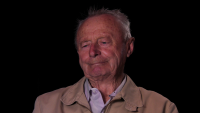The pressure from the Communists was worse for us than during the war from the Germans
Otto Habermann was born on January 6, 1928 in Bukovice near Písařov near the town Štíty, near the Czech-Moravian border, to parents of Czech nationality. Bukovice was back then largely inhabited by German-speaking inhabitants. After Munich, the area became a part of the German occupation, Czech schools were closed and the lessons took place only in German. It was very difficult for the witness and other Czech children, because none of them spoke German well. When the war ended, Otto experienced the expulsion of the Sudeten Germans here. In the barn in Bukovice, a German family of three was brutally murdered at the time. After the onset of the communist regime in 1948, the Habermanns were pushed to join the Unified Agricultural Cooperative (JZD). The farm they had was thirteen hectares of land and livestock. Due to this, Otto had an unsatisfactory personnel profile, and immediately after joining the military service in 1950, he was assigned to the Auxiliary Technical Battalions after a political check. Thanks to the foresight of his father František, who had a displaced German house transferred to him, which no one wanted in the village, and thus untied him from the co-ownership of the farm. The witness was eventually transferred to a normal military unit in Milovice. The Habermanns managed to maintain their farm until 1958. Otto then worked in the Unified Agricultural Cooperative (JZD) as an agronomist. After two years, the JZD was taken over by the state company, where Otto worked until his retirement in 1988. He and his wife Hana raised three children, Libuše, Hana and Otto.

